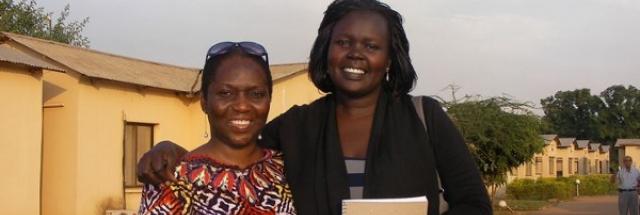Reconciliation committee Chairman encourages peace mobilisers
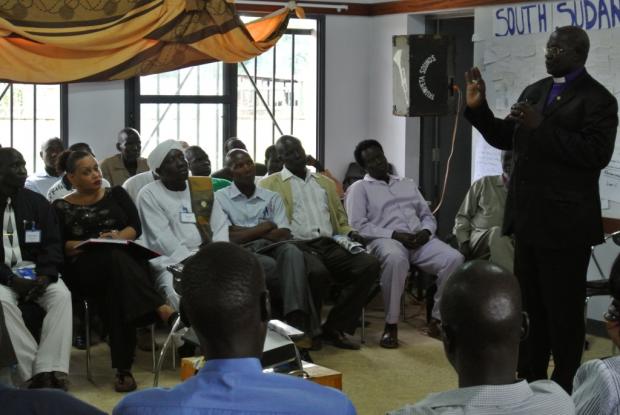
‘If you have not changed, you cannot change your country.’ This challenge to the 200 peace and reconciliation mobilisers and facilitators from Archbishop Daniel Deng Bul of the Episcopal Church of Sudan during their training on the morning of 29 April. He spoke of the dangers of classifying South Sudanese according to their tribes instead of proclaiming the unity and equality of all southerners, and appealed to the mobilizers to look first at themselves when advocating for change.
‘If you are struggling on behalf of those who cannot speak, you need to change, because God listens to those who are changed from within,’ said the Archbishop, recounting how speaking out had landed him in prison, beatings and being taken off airplanes. ‘Only if you deny yourself can you truly speak for those who have no voice.’
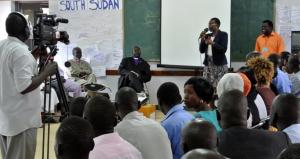 Archbishop Deng was recently appointed the Chairman of a new committee charged by President Salva Kiir Mayardit with organizing a conference on healing, peace and national reconciliation. This new committee, convened by Presidential decree on 22 April, will take forward the work of the ‘journey of healing for national reconciliation’ that IofC International and IofC South Sudan have been supporting, in partnership with the government’s Peace and Reconciliation Commission.
Archbishop Deng was recently appointed the Chairman of a new committee charged by President Salva Kiir Mayardit with organizing a conference on healing, peace and national reconciliation. This new committee, convened by Presidential decree on 22 April, will take forward the work of the ‘journey of healing for national reconciliation’ that IofC International and IofC South Sudan have been supporting, in partnership with the government’s Peace and Reconciliation Commission.
The committee will also include three bishops, a leader from the Muslim community and representatives from women, youth and civil society organizations, as well as from each of the ten States. It will officially begin its work once all committee members have met with the President.
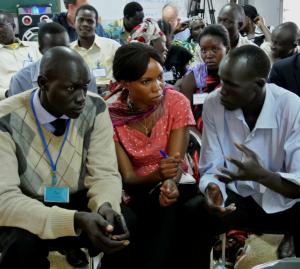 The mobilizers graduate this week from the training conducted by an international IofC Workshop for Africa team, assisted by eight trained South Sudanese facilitators and by a number of local civil society groups. ‘We will touch every corner, every state, every payam, every boma,’ said the Archbishop, to applause, ‘and you will be part of the structures’ to take national reconciliation across the country. He appealed to the mobilizers to help with gathering data from across all States in order to reveal the sources of lingering tensions and conflict among South Sudanese, alongside other mobilizers who have been trained in previous programmes.
The mobilizers graduate this week from the training conducted by an international IofC Workshop for Africa team, assisted by eight trained South Sudanese facilitators and by a number of local civil society groups. ‘We will touch every corner, every state, every payam, every boma,’ said the Archbishop, to applause, ‘and you will be part of the structures’ to take national reconciliation across the country. He appealed to the mobilizers to help with gathering data from across all States in order to reveal the sources of lingering tensions and conflict among South Sudanese, alongside other mobilizers who have been trained in previous programmes.
President Kiir last week has officially declared national reconciliation as one of the priorities for South Sudan. In his speech opening the new session of the National Assembly, the President said: ‘We must learn to reconcile our differences for the betterment of our nation. I believe that a process to address reconciliation is indeed imperative for this country… As President, this is one of my priorities for this young nation. But we must create an inclusive and people-driven process in order to achieve true reconciliation.’
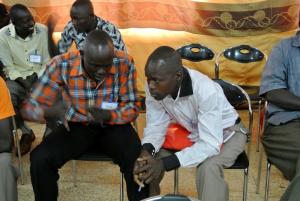 Earlier, on 15 April, the President issued a decree suspending the original conference and the existing organizing committee with which IofC International was a partner, until such time as a new committee could be appointed to oversee the process. IofC therefore deferred preparations on the conference and campaign initially scheduled for April (later postponed to June). On Friday 26 April, the President received Ginn Fourie and Letlapa Mphalele from South Africa, along with two representatives of IofC International. He thanked them for their contribution to reconciliation and for a letter delivered to him from the President and Vice-President of IofC International, expressing commitment to assist the reconciliation process in any way appropriate under the leadership of the new committee.
Earlier, on 15 April, the President issued a decree suspending the original conference and the existing organizing committee with which IofC International was a partner, until such time as a new committee could be appointed to oversee the process. IofC therefore deferred preparations on the conference and campaign initially scheduled for April (later postponed to June). On Friday 26 April, the President received Ginn Fourie and Letlapa Mphalele from South Africa, along with two representatives of IofC International. He thanked them for their contribution to reconciliation and for a letter delivered to him from the President and Vice-President of IofC International, expressing commitment to assist the reconciliation process in any way appropriate under the leadership of the new committee.
For all involved in getting the reconciliation process onto the national agenda, it has been a challenging road, filled with ups and downs. As one of the participants in the training expressed: ‘When we talk about a journey of healing for national reconciliation, we must be on the road, not by the roadside.’
Photos by Rob Lancaster

